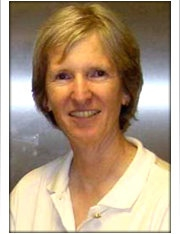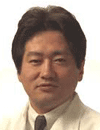Karen Aboody
Associate Professor, City of HopeKaren Aboody received her MD at Mount Sinai School of Medicine, and completed her post-doctoral training in Molecular Neurogenetics at Massachusetts General Hospital, Harvard Medical School. She currently heads a translational stem cell-oncology laboratory at City of Hope, focused on using tumor-tropic stem cells as delivery vehicles to target therapeutic agents to invasive and metastatic solid tumors, including brain tumors. In 2010, she received FDA approval for a first-in-human clinical safety trial for neural stem cell (NSC)-mediated enzyme/prodrug therapy for patients with recurrent high-grade glioma. She also received an $18MM CIRM Disease Team Award in 2010 to bring a second generation NSC-mediated therapeutic product to clinical trial for brain tumors by 2014. Recently, she received an NIH U-01 to translate this NSC-mediated approach for the treatment of metastatic neuroblastoma. Dr. Aboody received the AANS Young Investigator award in 2000, and the ASGT Outstanding New Investigator Award in 2008. In 2011, she founded TheraBiologics Inc., a clinical stage biopharmaceutical company, to support clinical development of NSC-mediated cancer therapies. |  | | | Ingrid Caras
Senior Science Officer, California Institute for Regenerative MedicineDr. Ingrid Caras is a Senior Science Officer at the California Institute for Regenerative Medicine (CIRM) where she is involved in developing and implementing CIRM’s scientific programs. Prior to joining CIRM in September, 2009, she held the positions of Executive Director of Preclinical and Clinical Development Sciences and Senior Director of Bioanalytical Sciences at PDL Biopharma, where she oversaw a multi-functional department responsible for preclinical development of therapeutic antibodies and for the non-clinical portions of early clinical trials. In this role, she participated in strategy development for development programs in oncology and immunology and contributed to multiple IND filings and early clinical trials.
Before joining PDL Biopharma in 2003, Dr. Caras spent 5-years as Director of Cell Biology and Development Sciences at Eos Biotechnology, and 14-years at Genentech, initially as a Scientist and later as a Senior Scientist. Dr. Caras has extensive experience in both basic research as well as drug development and has worked in a number of diverse areas that include immunology, cell and molecular biology, cancer and neuroscience. She was principal consultant at IWC Bioscience and provided consulting services to the pharmaceutical industry, particularly in the area of immunogenicity of biologics.
Dr. Caras earned a B.Sc (Hons) degree from the University of the Witwatersrand in Johannesburg, South Africa and a Ph.D. from the Hebrew University of Jerusalem in Israel. She did post-doctoral training at Harvard University and at the University of California, San Francisco. |  | | | Prue Talbot
Director, University Of California RiversideMy laboratory has studied the toxicological effects of tobacco products and tobacco-related disease for approximately 20 years. My laboratory has focused recently on new tobacco products including harm reduction cigarettes, Snus, dissolvables, and electronic cigarettes, and we are one of the few labs in the United States to have studied electronic cigarettes. Much of our work has been done on the effects of tobacco products on reproduction and development, with comparisons to adult lung cells. About 5 years ago, we began working with human embryonic stem cells (hESC) and have used them as a model to study the effects of tobacco products on human prenatal development. Pluripotent hESC enable us to evaluate chemical effects on cells equivalent to the epiblast stage of in vivo development. Differentiation of hESC enables us to study specific developmental processes during chemical exposure. These methods when combined provide very powerful tools to examine how environmental chemicals including those in tobacco products affect prenatal development, the most sensitive period in our life cycle. Our lab has developed methods for rapidly screening chemicals using small colonies of hESC in a reproducible quantitative manner. This method when combined with human adult cells enables reliable comparison of chemical toxicity in embryonic and differentiated adult cells. We are particularly interested in how new tobacco products effect embryos/fetuses and adults.
In addition, I have been involved in forming and administering new academic and research units on my campus. In 1999, I became the founding Director of the Interdepartmental Graduate Program in Cell, Molecular and Developmental Biology. In 2007, I founded the UCR Stem Cell Center, which in 2009, expanded to include a Stem Cell Core Facility that I currently direct. |  | | | Allan Wu
Chief Scientific Officer, The Morrow InstituteDr. Allan Wu is an Aesthetic Reconstructive Cosmetic Surgeon with formal fellowship background training in Surgical Molecular and Cellular Biology from UCLA and Molecular Embryology from the Bourn Hall Clinic in Cambridge U.K. (home of the world’s first “test tube baby”). He is also a board certified tissue banking specialist and cryobiologist. He has worked extensively with the American Association of Tissue Banks in formulating early recommendations for proper tissue banking of adult mesenchymal stem cells. He is currently tenured as director of Women’s Health and Surgery, Regenerative Medicine and Chief Scientific Officer at Regenerative Surgery Institute |  | | | Kotaro Yoshimura
MD, Department of Plastic Surgery, University of TokyoSorry, There is currently no biography for this presenter. |  | | |
|

 Add to Calendar ▼2013-04-22 00:00:002013-04-23 00:00:00Europe/LondonClinical Translation of Stem Cells SummitClinical Translation of Stem Cells Summit in Palm Springs, CA, USAPalm Springs, CA, USASELECTBIOenquiries@selectbiosciences.com
Add to Calendar ▼2013-04-22 00:00:002013-04-23 00:00:00Europe/LondonClinical Translation of Stem Cells SummitClinical Translation of Stem Cells Summit in Palm Springs, CA, USAPalm Springs, CA, USASELECTBIOenquiries@selectbiosciences.com